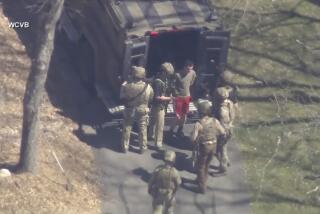Pentagon Official Resigns, Alleges Cover-Up on MIAs : Military: He sees an effort to ‘bury the whole mess out of sight and mind’ as U.S. seeks better Hanoi ties.
- Share via
WASHINGTON — The chief of the Defense Intelligence Agency’s Special Office for Prisoners of War and Missing in Action has resigned, leaving behind a memo that accuses the government of disregarding and possibly even covering up information on U.S. prisoners who may have been left in Southeast Asia after the Vietnam War.
Army Col. Millard A. Peck wrote that his office was being used as a “ ‘toxic waste dump’ to bury the whole ‘mess’ out of sight and mind in a facility with limited access to public scrutiny.” Peck made the accusations in a scathing five-page memorandum and farewell note that his co-workers found stapled to his office door after his resignation on March 28.
The document has been the subject of discussion for almost a month on Capitol Hill, and a copy of the memo was obtained Monday by The Times.
Peck’s allegations come as momentum is building in the Bush Administration to normalize relations with Vietnam. But a major stumbling block to that effort is the failure to resolve the fate of the more than 2,000 Americans still listed as missing in action in Southeast Asia.
President Bush has insisted that the POW-MIA issue remains “a matter of highest national priority.”
But Peck suggested in the memo that the efforts of some in the Administration are less than aggressive. “It appears that the entire issue is being manipulated by unscrupulous people in the government, or associated with the government,” he wrote. “The entire charade does not appear to be an honest effort, and may never have been.”
Instead of pursuing leads about POWs and MIAs, officials concentrate on “finding fault with the source” of the information, he wrote. “The mind-set to ‘debunk’ is alive and well.”
The document on the door was a copy of a memo Peck originally sent to his superiors in February, in which he announced his intention to leave the job he had held for eight months and asked permission to retire from the Army altogether “so as to avoid the annoyance of being shipped off to some remote corner, out of sight and out of the way.”
Peck, who is still on active duty, has been reassigned to the Military District of Washington. He did not return phone calls placed to that office Monday.
A highly decorated veteran of three tours in Vietnam, Peck held several other DIA posts, including duty director for intelligence and chief of the Asia division for current intelligence, before taking charge of the POW-MIA office.
His complaints have come to the attention of Defense Secretary Dick Cheney and are the subject of “an internal management inquiry,” Pentagon spokesman Lt. Cmdr. Ned Lundquist said Monday.
The families of the missing have long contended that the government, preoccupied with the political imperative of putting the Vietnam War behind it, has given insufficient attention to reports of live sightings and other information suggesting that Americans were left in Southeast Asia.
Their concerns have grown as relations between the United States and Vietnam have begun to thaw. Last month, the two nations said they would set up an office in Hanoi to resolve the cases of missing Americans, and the Administration announced the first aid to Vietnam since the war--$1 million to be spent on artificial limbs for those who were wounded.
Some Administration critics said Peck’s charges appear to provide proof that the government has not pursued new information vigorously enough.
“It appears that we’ve abandoned live Americans. That’s something that some people have said for a long time,” said Mike Van Atta, an activist on the issue.
“He has all the credibility in the world on this issue. As far as I’m concerned, he’s a hero,” added Sen. Robert C. Smith (R-N.H.), who is spearheading an effort to establish a Senate select committee to investigate unresolved MIA cases.
Last September, Sen. Charles E. Grassley (R-Iowa) and investigators for the Senate Foreign Relations Committee spent days poring over classified DIA files as part of an investigation into whether the government had done what it could to clear up the fates of Vietnam-era MIAs.
Grassley said committee investigators plan to release their report on Thursday and that it will show that intelligence officials were quick to dismiss leads that should have been pursued. “Overall, we need to look at the entire operation,” Grassley said.
In his memo, Peck blamed the problems on unnamed “policy people” and a “larger and totally Machiavellian group of players outside of DIA.” One knowledgeable source said that criticism was directed at the Bush Administration’s POW-MIA Interagency Group, which includes senior officials from the National Security Council, State Department and Defense Department.
Large parts of the memo Peck left for his co-workers had been blacked out. But in an unexpurgated version obtained by The Times, he targeted special criticism at Ann Mills Griffiths, executive director of the National League of Families of American Prisoners and Missing in Southeast Asia.
In recent years, the league has been sharply criticized by other POW-MIA groups, which have accused the league of representing the interests of the Pentagon, rather than the families of the missing.
Peck contended that Griffiths “occupies an interesting and questionable position in the whole process.” She is given access to “top secret, code-word message traffic,” and “receives it well ahead of the DIA intelligence analysts,” he asserted.
“She is in the perfect position to clamor for ‘progress,’ while really intentionally impeding the effort,” he wrote.
Griffiths declined to comment, but League Chairwoman Sue Scott issued a statement saying Peck’s criticism should have been directed at Hanoi.
BACKGROUND
The United States still lists 2,276 Americans as missing in action or unaccounted for in the Vietnam War. Vietnam has returned more than 288 sets of remains since August, 1987, but only 117 have been verified as those of Americans. According to an interim report on the POW/MIA issue by the Republican staff of the U.S. Senate Committee on Foreign Relations, the U.S. government has insisted since April, 1973 that is has no evidence of living POWs. The Republican staff report contends that there have been nearly 11,700 related reports, including 1,400 of firsthand live sightings.
More to Read
Sign up for Essential California
The most important California stories and recommendations in your inbox every morning.
You may occasionally receive promotional content from the Los Angeles Times.










